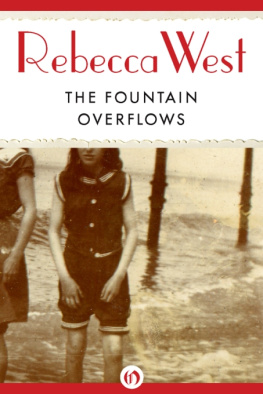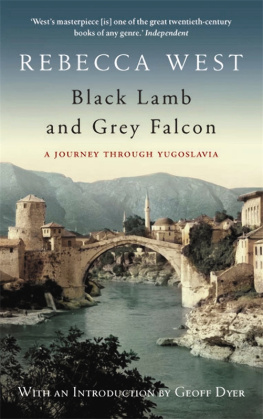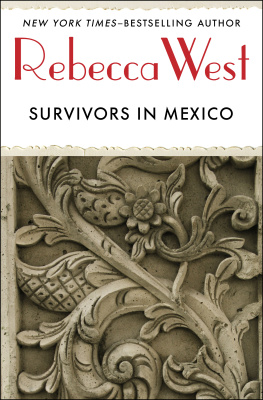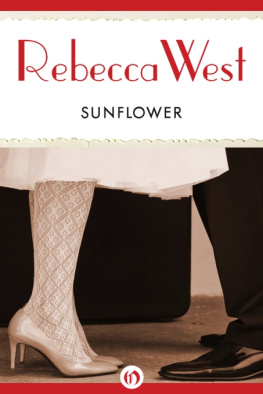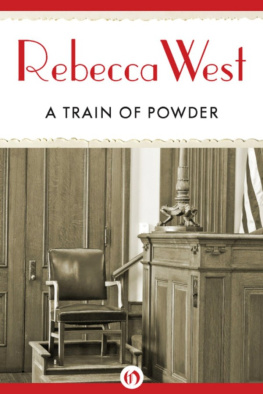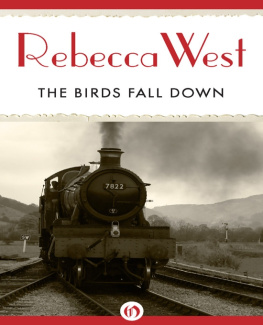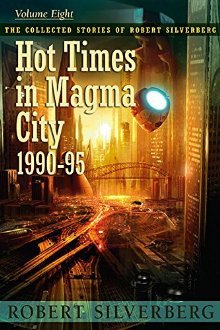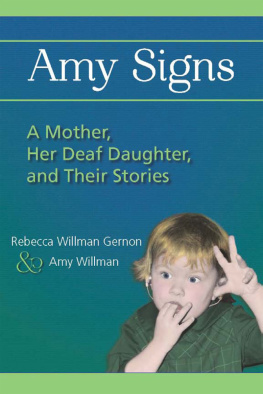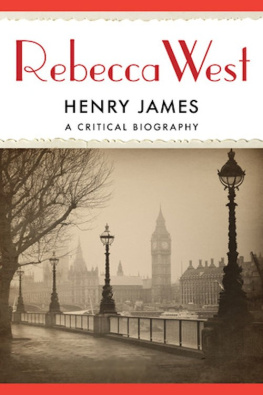Rebecca West - The Fountain Overflows
Here you can read online Rebecca West - The Fountain Overflows full text of the book (entire story) in english for free. Download pdf and epub, get meaning, cover and reviews about this ebook. publisher: Open Road, genre: Prose. Description of the work, (preface) as well as reviews are available. Best literature library LitArk.com created for fans of good reading and offers a wide selection of genres:
Romance novel
Science fiction
Adventure
Detective
Science
History
Home and family
Prose
Art
Politics
Computer
Non-fiction
Religion
Business
Children
Humor
Choose a favorite category and find really read worthwhile books. Enjoy immersion in the world of imagination, feel the emotions of the characters or learn something new for yourself, make an fascinating discovery.
- Book:The Fountain Overflows
- Author:
- Publisher:Open Road
- Genre:
- Rating:4 / 5
- Favourites:Add to favourites
- Your mark:
- 80
- 1
- 2
- 3
- 4
- 5
The Fountain Overflows: summary, description and annotation
We offer to read an annotation, description, summary or preface (depends on what the author of the book "The Fountain Overflows" wrote himself). If you haven't found the necessary information about the book — write in the comments, we will try to find it.
The Fountain Overflows — read online for free the complete book (whole text) full work
Below is the text of the book, divided by pages. System saving the place of the last page read, allows you to conveniently read the book "The Fountain Overflows" online for free, without having to search again every time where you left off. Put a bookmark, and you can go to the page where you finished reading at any time.
Font size:
Interval:
Bookmark:
The Fountain Overflows
Rebecca West

TO MY SISTER
Letitia Fairfield
Contents
T HERE WAS such a long pause that I wondered whether my Mamma and my Papa were ever going to speak to each other again. Not that I feared they had quarrelled, only we children had quarrels, but they had each fallen into a dream. Then Papa said hesitantly, You know, I am very sorry about all this, my dear.
Mamma answered almost before he had finished, It will not matter at all, provided that everything goes right this time. And it will go all right, wont it?
Yes, yes, I am sure it will, said Papa. A sneer came into his voice. I should be able to do all that is asked of me. I should be able to edit a small suburban newspaper.
Oh, my dear Piers, I know the work is not worthy of you, said Mamma warmly. Yet what a godsend it is, how lucky it is that Mr. Morpurgo should happen to own such a paper, and how good it is of him to want to help you She faltered before she came to the end of her sentence.
Again, said Papa absently, simply supplying the word. Yes, it is odd that such a rich man as Morpurgo should bother himself with a thing like the Lovegrove Gazette. It brings in a fair profit for what it is, so they tell me, but it is very small beer for a man with those enormous interests. But I suppose if one accumulates a great fortune all sorts of rags and bones get mixed with the diamonds and the nuggets. He retired once more into his dream. His grey eyes, bright under his straight black brows, pierced the walls of the farm-house parlour. Even though I was a very little girl I knew that he was imagining what it was like to be a millionaire.
Mamma lifted the brown teapot and refilled his cup and hers, and sighed, and his eyes went back to her. You hate being left here in this lonely place?
No, no, I am happy anywhere, she said. And I have always wanted the children to have a holiday on the Pentland Hills as I did when I was their age. And there is nothing better for children than life on a farm; at least people always say so, I cant imagine why. But letting the flat furnished, that I do not like. Such a thing to have to do.
I know, I know, said Papa, sadly but impatiently.
All this happened more than fifty years ago, and my parents were not making a fuss about nothing. In those days few respectable people were willing to let their homes furnished, and no respectable people ever wanted to take them.
I know these people have a good reason for wanting somewhere to stay for the summer, coming over from Australia to see this daughter of theirs in Doctor Philips sanatorium, Mamma murmured, but such a risk, leaving strangers in the flat with all that good furniture.
I suppose it is valuable, said Papa thoughtfully.
Well, of course, it is only Empire, said Mamma, but for what it is, it is the best. Aunt Clara bought it all in France and Italy when she was married to the French violinist, and it is all solid and comfortable, and, though I know it is not Chippendale, the chairs with the swans and the others with the dolphins heads are really very pretty, and the silks with the bees and the stars are quite handsome. We shall be thankful to have all that furniture when we start afresh at Lovegrove.
At Lovegrove, said Papa. Really, it is very strange that I should be going back to Lovegrove. Isnt it strange, Rose, he said, giving me a lump of sugar from the bowl, that I should be taking you back to a place where I used to stay when I was little like you?
Was Uncle Richard Quin there too? I asked. Papas brother had died in India of fever when he was twenty-one. He had been christened Richard Quinbury to distinguish him from another Richard in the family, and Papa had loved him so much that he had called our little brother by his name, and we regarded our little brother as much the nicest of us four children, so we thought of our dead uncle as a joy stolen from us and were always trying to recover him in our fathers stories.
Richard Quin was there too, said Papa, or I should not remember it so well. The places I visited without him are never so distinct.
Try to find us a house near the house where you stayed, said Mamma. It will be an interest for the children.
What was the name, I wonder. Oh, yes, Caroline Lodge. But of course it will have been pulled down long ago. It was quite a small house but very charming.
Suddenly Mamma laughed. Why should it have been pulled down? You are so gloomy about everything except the future of copper mines.
Copper will come right in the long run, said Papa, cold with sudden anger.
My dear, you must not mind what I say! she protested. She and I looked at him anxiously, and after a minute he smiled. All the same, he then glanced at the clock, and said that it was time he was getting back to the station, if he were to catch the six-oclock train to Edinburgh; and the light had gone out of him, he had that shabby, beggar look that even we children sometimes had to remark in him. Tenderly Mamma told him, Very well, we dont want you to miss your train and have to hang about that draughty little station for hours, though heaven knows we want to keep you with us till the last moment. Oh, it is good of you, indeed it is, when you have so much on your mind, to help me bring the children down here.
It is the least I could do, he answered heavily.
While the trap was being brought round we went out and stood on the holystoned steps of the farm-house. The paddock in front of us stretched down to the shores of the loch, which was a dark shining circle, perfectly round, under the grey-green walls of the valley. Midway to the water we could see two white scraps that were my elder sister Cordelia and my twin sister Mary, a blue scrap that was my little brother, Richard Quin. He was just old enough now to run about very fast and fall down, always without hurting himself, and to babble and laugh and tease us; we played with him all day and never grew tired of him.
My mother threw back her head and called to them, her voice going straight out like the cry of a bird, Children, come and say good-bye to your father!
My sisters were for one moment frozen where they stood. In this new lovely place they had forgotten what overhung us. Then Cordelia picked up Richard Quin and hurried as fast as was safe; and then the four of us stood and looked up at Papa, looking hard so that we would remember him perfectly while he was away these dreadful six weeks. It was perhaps a mistake to look so hard at him, he was so wonderful. This was no childish delusion; we were objective enough about certain things. We all knew that Mamma was not good-looking. She was too thin, her nose and forehead were shiny like bone, and her features were disordered because her tortured nerves were always drawing a rake over her face. Also we were so poor that she never had new clothes. But we were conscious that our Papa was far handsomer than anybody elses. He was not tall, but he was slender and graceful, he stood like a fencer in a picture, and he was romantically dark; his hair and his moustache were true black, and his skin was tanned, with a faint rose under the tan on his cheeks; and he had high cheekbones, which made his face sharp like the muzzle of a catit was the least stupid face one could imagine. Also he knew everything, he had been all over the world, even to China, he could draw and could carve wood and make little figures and dolls houses. Sometimes he would play games with us and tell stories, and it was almost impossible to bear it, every moment brought forth such an intense delight, quite unpredictable, so that one could not prepare for it. It was true that sometimes he would take no notice of us for days, and that too was almost unbearable. But it was part of our grief that we were not going to suffer that woe either for six weeks.
Next pageFont size:
Interval:
Bookmark:
Similar books «The Fountain Overflows»
Look at similar books to The Fountain Overflows. We have selected literature similar in name and meaning in the hope of providing readers with more options to find new, interesting, not yet read works.
Discussion, reviews of the book The Fountain Overflows and just readers' own opinions. Leave your comments, write what you think about the work, its meaning or the main characters. Specify what exactly you liked and what you didn't like, and why you think so.

